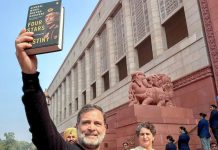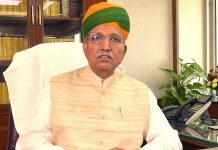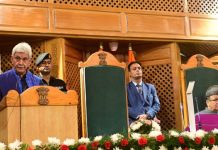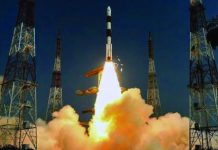Curiously, the variations of the separatist slogans are now yelled in mainstream political rallies including, lo and behold, those of the BJP. The reason for this is that these slogans are known to everyone in the valley, helping the parties to connect easily with the masses. A report by Riyaz Wani
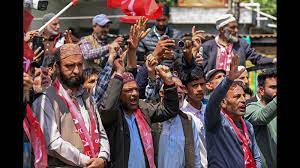
The ongoing election rallies in Srinagar have seen the revival of old slogans alongside new ones, reflecting the evolving political narrative in the region and at the same time harking back to the past.
Traditional political leaders, including Dr Farooq Abdullah and his son, Omar Abdullah, of the National Conference, are being hailed as lions by their supporters. At rallies, enthusiastic crowds chant, “Aaya aaya, sher aaya” (The lion has come, the lion has come). Similarly, supporters of People’s Democratic Party’s Srinagar candidate, Waheed-ur-Rehman Parra, and Peoples Conference chairman Sajad Gani Lone, chant, “Nakli shera yeti wat dera, asli shera aa gaya” (Time for fake lions to leave, the real lion has arrived).
The political atmosphere intensified further during a recent BJP rally in Pulwama, where party workers chanted, “Jis Kashmir jo khoon se seencha, woh Kashmir hamara hai” (The Kashmir we drenched in blood, is our Kashmir), alongside the slogan “Ragdo ragdo, NC ragdo PDP ragdo” (Wipe out NC, Wipe out PDP).
Ironically, both of these slogans have separatist origins. The first slogan traces back to the struggle for the right to self-determination through the fifties and sixties, spearheaded by Sheikh Mohammad Abdullah, the founder of the National Conference. And the latter one was coined during the six-month long unrest in the Valley in 2008 during which over 100 people were killed. However, the BJP has adapted the slogan to the current election in the Valley.
The PDP has made a clever use of the slogans coined by the separatists, some of them during the several unrests over the past one and a half decade. For instance one of them goes like: “Na jhukne waali PDP, na bikne waali PDP” (The party which won’t surrender or sell out is the PDP). The slogan was earlier used to describe the politics of the deceased top separatist leader Syed Ali Shah Geelani. The slogan then went as: “Na jhukne waala Geelani, na bikne waala Geelani”.
This is not the first time that the PDP has adapted separatist symbols to garner public support. In the past, the party has even appropriated parts of the separatist agenda, an exercise that once earned it the label of a soft-separatist party. However, this political agenda helped the party tap into the Valley’s separatist constituency.
These slogans, deeply rooted in Kashmir’s political history, serve as potent symbols of pride, strength, and unity for the Kashmiri people. The slogan “Sher-e-Kashmir Zindabad” (Long live Sher-e-Kashmir), originally used to honour Sheikh Abdullah’s leadership, has now become a rallying cry for various political parties.
In the parliamentary elections in Kashmir, these slogans have gained renewed significance, reflecting the changing political landscape of the region. With traditional political parties reclaiming centre stage, the fleeting fame of self-proclaimed “sher” personas on social media seems to be diminishing.
However, the resurgence of the traditional slogans is not without controversy. The BJP’s use of slogans traditionally associated with separatist sentiments has raised eyebrows. The chanting of “Jis Kashmir jo khoon se seencha gaya hai, woh Kashmir hamara hai” attracted widespread attention, given its historical association with anti-India protests.
What is significant is that the variations of the separatist slogans are now yelled in mainstream political rallies including those of the BJP. The reason for this is that these slogans are known to everyone in the Valley, helping the parties to connect easily with the masses.

